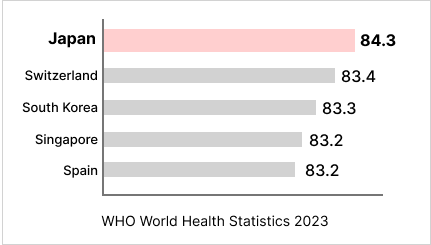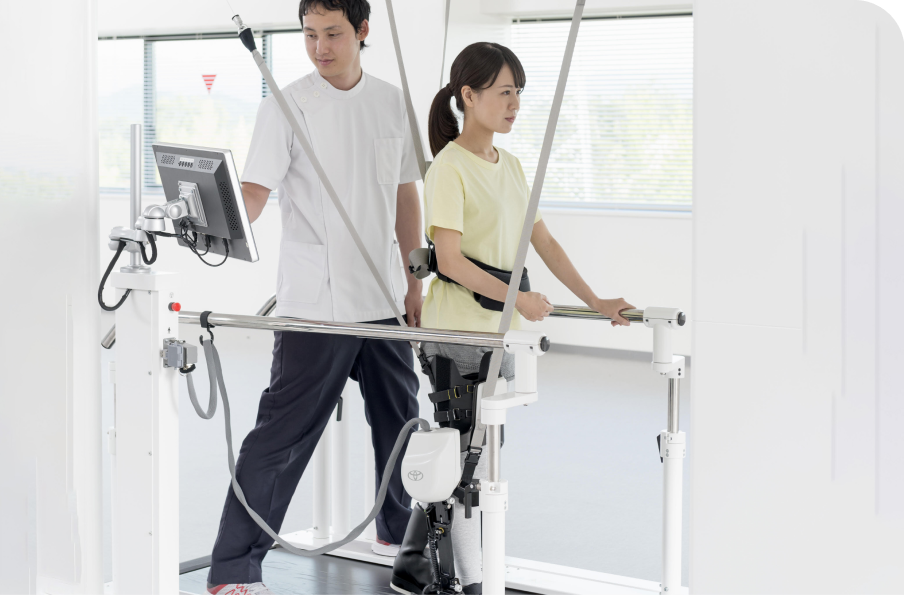
World-leading average life expectancy of 84.3 years
Japan’s average life expectancy is 84.1 years (81.5 years for men and 85.6 years for women), the longest in the world. Here we explain the high medical standards and healthy habits that are said to be supporting factors.
Features of medical care in Japan
Japan's long life expectancy is underpinned by its medical care. Japanese medical care is highly regarded around the globe, and some hospitals are open to foreigners traveling to Japan for medical treatment. Fancy receiving a health checkup or advanced medical care in Japan?
Comprehensive medical checkups and Preventive Medical Care
The concept of comprehensive medical checkups originated in Japan. The entire body is thoroughly examined over a period of half a day to several days with the aim of detecting early signs of diseases, with a focus on detecting cancer and lifestyle-related diseases (cerebrovascular disease, cardiovascular disease, diabetes, liver disease, etc.). In addition to standard tests such as blood tests, X-rays, endoscopy, ultrasound, mammography, and electrocardiograms, CT, MRI, PET, and biomarker tests can also be performed since hospitals in Japan are equipped with CT, MRI, and PET examination equipment. Health checks are common in Japan, and about half of cancer cases (45%) are at the localized stage upon diagnosis, making early treatment possible. The 5-year survival rate for localized cancer is 92.4%, meaning early detection, diagnosis, and treatment are crucial when dealing with this disease. After a check-up, you will receive dietary and lifestyle recommendations to support your life-time health. In various cities throughout Japan, you will find clinics equipped with advanced testing devices and staffed with physicians and other medical professionals possessing excellent diagnostic techniques. Visitors may wish to look for a facility close to one of their sightseeing destinations and can choose from a variety of health check options, price ranges, and objectives.

-
Particle beam therapy

No.1in the world
(Number of treatment facilities and number of cases)
-
Thoracic cavity/Laparoscopic surgery,Robot-assisted surgery

97.7%
(5-year survival rate for stage 1 gastric cancer)
-
Endoscopy/Treatment

99.1%
(5-year survival rate for stage 1 colorectal cancer)
Japan's high-quality medical care and advanced technology
Medical services in Japan are highly effective and safe, allowing us to provide the highest standard of medical care to patients from around the globe. The quality of Japan’s hospitals is ensured by external audits conducted by bodies such as the Japan Medical Evaluation Organization and JCI.
Patients have access to the latest and most advanced treatments.
-Many hospitals adopt minimally invasive forms of surgery such as robotic surgery, endoscopic surgery and laparoscopic surgery.
-Japan has the highest number of particle beam treatment machines in the world. This treatment is offered to tackle intractable cancers such as head and neck cancer.
-There is also an ever-increasing track record of using cutting-edge treatments such as gene therapy and regenerative medicine with IPS cells and stem cells.

Rehabilitation enables recovery and reintegration
In Japan, rehabilitation is always provided after major illnesses such as cerebrovascular disease or trauma to restore physical functions as much as possible. Our world-class rehabilitation system provides optimal training for each patient's condition in each phase: acute, recovery and follow-up. Medical professionals such as physical therapists, occupational therapists and speech therapists work together as a team to support the goal of each patient. There have been cases where patients who in their home country were never expected to walk again independently, have regained their ability through rehabilitation in Japan.
Quality and safety backed by rigorous standards
Japanese medical facilities meet medical safety and infection control guidelines regulated by Japan’s Ministry of Health, Labour and Welfare. Most of the hospitals that welcome foreign patients have JCI and Japan Healthcare Organization certifications based on external audits meeting global standards.
Healthy diet recommended by doctors and registered dietitians
Dietary habits are also important in preventive care, so registered dietitians will provide advice on eating habits based on the results of your health checkups and medical examinations.
Meals provided in Japanese hospitals are supervised by registered dietitians. Appropriate therapeutic meals suited to your medical condition will be chose from a selection of more than 10 types based on doctor’s recommendations.
Excellent cost performance and accessibility
Treatment costs in Japan may turn out higher than in neighboring Asian countries hosting medical tourism. However, the cost will usually be lower when compared to European countries and the United States. (Coronary artery bypass surgery: $100,000 in the U.S., approximately $60,000 to $90,000 in Japan). Clinics and university hospitals across the country accept medical tourists, and foreign patients can choose facilities based on location, medical needs, and budget.
Attractive tourist destinations and developed transportation infrastructure
Japan is highly regarded worldwide for its cultural resources and infrastructure. Japan is also highly regarded for its safety and cleanliness and was ranked first in the World Economic Forum’s “Travel & Tourism Development Index” in 2021.
Public transportation is well developed, with trains, including bullet-trains, and buses being punctual, and taxis reliable and safe, offering efficient and comfortable transportation.
Q&AFrequently Asked Questions
- How can I find hospitals that welcome foreign patients?
- MEJ certifies hospitals that proactively accept foreign patients with proven records and provide high-quality medical services as Japan International Hospitals. (Click the link below for more information)
http://www.japanhospitalsearch.org/search/
- How do I make an appointment?
- Most hospitals accept patients through affiliated travel assistance companies. These companies provide comprehensive support such as the acquisition of medical visas, hiring interpreters, reserving accommodations during the stay, and transportation arrangements.
- How should I pay for medical expenses?
- Payment methods vary from facility to facility. In many cases, payment to the travel assistance company is required in advance. At some facilities, payment can be made in person at the hospital either by cash or by credit card, especially for small amounts.

AboutAbout Japan International Hospitals
Japan International Hospitals (JIH) system is an initiative to provide the information useful to international patients on hospitals in Japan where they may receive medical services, and information on travel assistances to help them. Medical Excellence JAPAN (MEJ) assesses a hospital from aspects of not only the quality and safety of medical services, but also system and efforts of hospital to accept international patients, and then recommends the hospital that has met the criteria. MEJ also provides the list of recommended hospitals and the information on their medical services.

